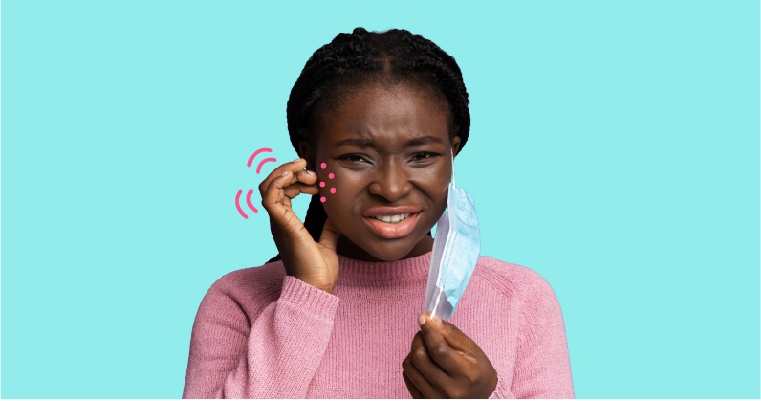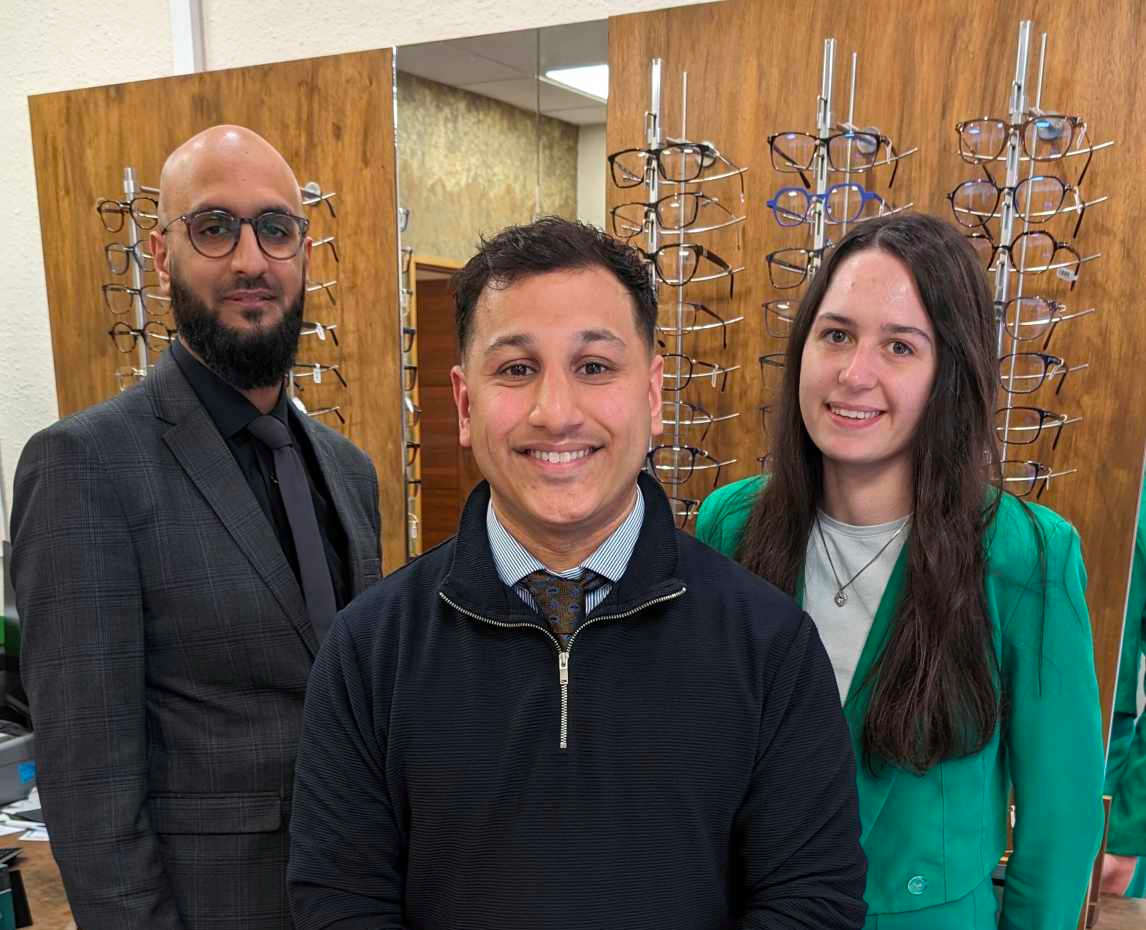
Washing hands more frequently or wearing a mask for longer periods of time is leading to skin irritations in some people. Our top tips cover what you can do to help keep your skin clear and comfortable.
As COVID-19 vaccinations roll out across the world, we all need to keep doing what we can to avoid picking up COVID-19 or passing it on.
For most of us, this means wearing a face mask, at least sometimes. We’re also washing our hands way more often. Unfortunately, masks and good hand hygiene come with their own problems, including spots and sore, dry skin.
Here’s a bit about the common problems, and what you can do to help keep your skin clear and comfortable.
Maskne
Dampness from your breath collects under masks, and sweat and oil gets trapped on your skin. So it’s not surprising that masks can cause your skin to break out. This so-called 'maskne' (mask + acne) can cause spots, bumps and rashes on your nose, chin or cheeks. You’re more likely to get it if you’re already struggling with skin issues like acne or rosacea. 1
Dermatitis
Another common mask-related problem is contact dermatitis. There are two types. Irritant dermatitis is caused by the physical contact of the mask. Allergic dermatitis happens if you’re allergic to the material or anything in it. Both can make your skin sore, red, tight and dry and itchy.2 Contact dermatitis most often affects the bridge of the nose, where the mask is tight. It’s particularly common among healthcare workers who have to wear masks for long periods of time, as well as goggles and visors.3
How to protect your face
Here are some tips to keep your complexion clear whilst protecting yourself and others from COVID-19:
- Soft is best - if you’re just wearing your mask for trips to the shops, rather than for professional PPE, pick a fabric that’s soft and smooth. This can help to reduce chafing4
- Try cotton - 100% cotton masks are soft and breathable. Try ones with cloth loops rather than elastic, or ones that tie behind your head, to reduce irritation4
- Wash regularly - treat your mask like you do your underwear, a fresh one each day. Wash daily at 60°C5
- Easy skincare - take your pre-mask skincare routine back to basics, with just a gentle fragrance-free cleanser and moisturiser. Save products with active ingredients for night-time, because masks can intensify their effects6
- Let creams sink in - it’s important to keep your skin well-moisturised because some masks can suck moisture from your skin. Try to apply face cream at least half an hour before you put your mask on to let it sink in7
- Bare-faced is best - going make-up free will reduce residue build-up under your mask and reduce the irritants that your skin has to deal with6
- Check you’re not allergic - some masks are treated with antibacterial agents, which can cause a reaction. Or your skin may react to your laundry detergent. Try something different and see if things improve1
- Medicated cream, if you need it - medicated creams can help with contact dermatitis. So talk to a doctor if your skin is red, dry and itchy and simple moisturisers don’t seem to be working8
Hand dermatitis
Hand hygiene is really important, but it takes its toll on your skin too. Doctors recommend regular handwashing with soap, for 20 seconds. And if this isn’t possible, use alcohol hand gel.
Frequent exposure to water, soap, and alcohol gel, as well as prolonged glove-wearing, can cause dry skin and contact dermatitis. The skin on your hands may start to itch, and become sore and red. You may develop small blisters, painful cracks (fissures) and broken skin.9
How to protect your hands
Here’s what you can do to reduce the damage to your hands:
- Follow-up wash - experts recommend washing with soap and water, but these are very drying, so you can always follow with an emollient wash if you need to
- Dry well - dry your hands fully after washing by patting them dry, not rubbing10
- Slather on hand cream - moisturisers (emollients) help to repair damaged outer skin and lock in moisture, keeping skin soft and supple. Apply creams (emollients) generously each time you wash your hands, and whenever your skin feels dry10
- Try overnight treatments - you might find an overnight moisturising treatment helpful. Apply a generous layer of moisturiser before you go to bed, then put on a pair of clean cotton gloves and leave overnight10
- Wear gloves when you can - wear gloves when your hands are going to come into contact with water or soap (other than handwashing), such as doing the washing up, household cleaning or shampooing a child’s hair10
- Take glove breaks - if you have to wear gloves for work, take them off when you have a break. This is a good opportunity to apply moisturiser if you have half an hour to let it soak in. And you could try a cotton liner under your latex or nitrile gloves 8
- Steroid cream, if you need it - steroid creams can help with contact dermatitis. So talk to a doctor if the skin on your hands is dry, itchy and cracked, and simple moisturisers don’t seem to be working8
References
- Johns Hopkins Medicine. Coronavirus: Tips to avoid maskne skin irritation. www.hopkinsmedicine.org/health/conditions-and-diseases/coronavirus/coronavirus-tips-to-avoid-maskne-skin-irritation, published 3 August 2020
- Unmasking PPE. American Academy of Dermatology, published 5 August 2020 www.aad.org/dw/dw-insights-and-inquiries/2020-archive/august/unmasking-ppe
- Lan J, et al. J Am Acad Dermatol. 2020;82(5):1215-1216. doi:10.1016/j.jaad.2020.03.014
- National Eczema Society. Advice on coronavirus (Covid-19) for people with eczema https://eczema.org/blog/advice-on-coronavirus-covid-19-for-people-with-eczema/ , published 8 January 2021
- NHS North Devon. Wearing a face mask or face covering during COVID-19. Guidance for staff, patients, contractors and visitors. www.northdevonhealth.nhs.uk/wp-content/uploads/2020/06/Face-mask-leaflet-NDHT-FINAL.pdf , published June 2020
- Hartford Healthcare. Dermatologist: How to Prevent Skin Problems From Your Face Mask https://hartfordhospital.org/about-hh/news-center/news-detail?articleid=26450&publicId=395, published 21 June 2020
- NHS England and NHS Improvement. Helping prevent facial skin damage beneath personal protective equipment. https://cdn.ps.emap.com/wp-content/uploads/sites/3/2020/04/NHSEI-Preventing-skin-damage-under-PPE.pdf, published 9 April 2020
- British Association of Dermatologists. Diagnosis, management and prevention of occupational contact dermatitis. National Guidelines. 2011. www.bad.org.uk/shared/get-file.ashx?id=792&itemtype=document
- British Association of Dermatologists. Audit highlights the impact of PPE and hand disinfection on the skin health of healthcare professionals during the COVID-19 pandemic. https://www.skinhealthinfo.org.uk/audit-highlights-the-impact-of-ppe-and-hand-disinfection-on-the-skin-health-of-healthcare-professionals-during-the-covid-19-pandemic/, published 2 September 2020
- British Association of Dermatologists.Covid-19 (Coronavirus): Statement on dry skin and frequent handwashing to reduce Covid-19 risk https://www.skinhealthinfo.org.uk/statement-on-coronavirus-and-skin-disease-affecting-the-hands/, published 3 March 2020
Blog by Dr Claudia Pastides from www.babylonhealth.com



 ADVERTISING FEATURE: Eden Private Hire goes from strength to strength
ADVERTISING FEATURE: Eden Private Hire goes from strength to strength
 INTERVIEW: Morecambe electrician firm celebrates its 10th birthday
INTERVIEW: Morecambe electrician firm celebrates its 10th birthday
 ADVERTISING FEATURE: Lancaster city centre opticians celebrates 50th birthday
ADVERTISING FEATURE: Lancaster city centre opticians celebrates 50th birthday
 ADVERTISING FEATURE: Lancaster property specialists celebrate 30th anniversary
ADVERTISING FEATURE: Lancaster property specialists celebrate 30th anniversary
 ADVERTISING FEATURE: Team from The Ship at Caton look back on 100 days at the helm
ADVERTISING FEATURE: Team from The Ship at Caton look back on 100 days at the helm





